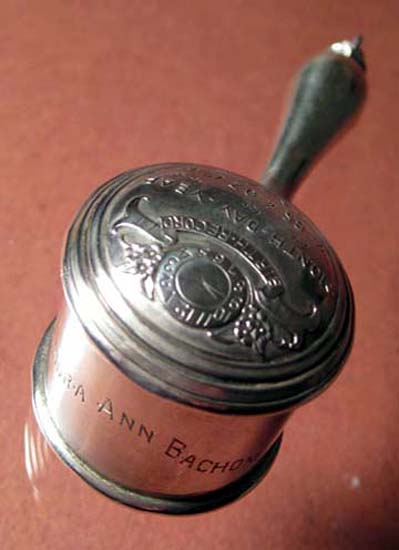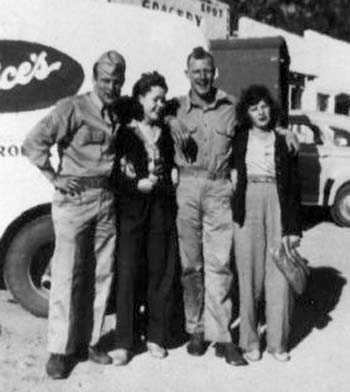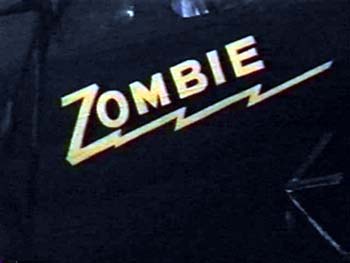
The dead cannot arrange for silver to be engraved. Yet here is a tarnished silver baby rattle that contradicts this fact. The rattle is etched with a baby's name, the date of birth and the name of the man who gave it to her. It was a gift from 'Uncle Dude', her father's younger brother, an uncle who had died six years earlier on December 20, 1942. Dude was aboard a B-17 bomber when German fighters shot it down over the English Channel. The crew had named their bomber 'Zombie'. Now it seemed that Dude had come back from the dead.
Dude was tall and broad with meandering waves of red hair. Friends joked that his laugh could raise seismic rings in a cup of coffee. Dude and his older brother Jack were raised in Los Angeles, where their father worked for the phone company while their mother looked after the boys and her elderly parents. Dude joined the Army Air Force two months after Pearl Harbor; Jack had joined the Navy the week before. With both sons in military service, a local veteran's group presented their mother with two 'Blue Star' flags to hang from her porch. A blue star was replaced with gold when a family member was lost in the war.
Briggs Field lies near El Paso on the flat Texas border that seems to hold New Mexico on a shelf. Dude arrived at Briggs in August of 1942 to begin advanced training as a member of the 303 Bomb Group. Dude trained for 60 days learning to become a B-17 radio operator. It was a role that included the mastery of complicated aeronautic radio equipment, competency in air-to-ground photography and when necessary, the ability to fire the 25 Caliber machine gun mounted in the top turret aft of the cramped radio room.

There is a photo taken in Texas of Dude and a crewmate with two young women standing between them. The other airman is caught with his face set in mock bravado, the women in the awkward smiles of short time girlfriends. But Dude is beaming as if the place, the time, the company and the circumstances were as perfect as life could provide. He had cut his red hair in a Mohawk; the implication was clear that he was preparing to do battle. But his smile, a freeze of his famous laugh, was so incongruous with the image of a warrior, the result is more farce than fierce.
The tail gunner's position on a B-17 isn't the safest seat in the house, but it does offer a spectacular view. It's a greenhouse with a gun, a perch to observe the awesome geometric formation of a 100 flying battleships sailing through a vast sea of sky. But the vista changes as the bombers approach their target. The sky begins to explode in black blooms of flak that can rattle a ship to its rivets and threaten to toss it from the air. Some airmen were more fearful of flak than the German fighters. Fighters could be fought off with their machine guns. Flak could not be shot down.
When the flak stopped, the Luftwaffe fighters took up the battle. They gathered in clusters ahead and behind the bombers and began their charges, aiming for front or tail shots, ripping the sky with their 20 MM machine guns at 15 rounds per second. Frontal attacks could shatter the Plexiglas nosecone killing both pilots, sending the bomber down in an uncontrolled spin. A few parachutes might pop out from the hatches or the bomb bay doors, but not often. Bailing out of a bomber in a tight spin must be like trying to tie your shoes from inside a rolling barrel.
There are three official versions of the Zombie's last minutes in the air. One pilot wrote "B-17 went down apparently under reasonable control in tight spiral. Part of # 2 motor shot away, # 4 motor on fire. 2 chutes believed bailed out."
Another pilot "... saw this ship go down -- 5 chutes seen to open."
From a different witness, "... B-17 circling near coast of France-2 engines on fire ... being attacked by several enemy aircraft."

And there is a tail gunner's account that doesn't appear in the official records. It was written in a letter to Dude's niece, 60 years after the Zombie was lost. He wrote, "I knew your Uncle Dude, he was the squad comedian, he kept everybody laughing ...When the Zombie was hit, I followed it down to the water. When it ditched I think the top turret gunner was still firing." The flier who had taken the picture of Dude in his Mohawk wrote the letter.
On December 25th, a War Department telegram arrived informing his family that Dude was 'Missing in Action'. As terrible as it sounded, the phrase conveyed a hope that the words, 'Killed in Action' would have obliterated. Dude's mother clung to this distinction, awaiting news from the Red Cross that her son had been captured or found wounded in some remote French village. This news never came, yet she continued to believe that Dude would come home. Her hope persisted beyond the end of the war, beyond any reasonable chance of his return and beyond the birth of her first granddaughter on October 14, 1948.
On this day, she visited the Bulocks Department store on Wilshire Blvd. She chose a silver rattle and had it engraved with her granddaughter's name, the date of her birth and the name of her absent son. It would be a gift from an uncle she would never have.
His mother's never-ending hope didn't bring Dude back to life, but it kept him in memory and brought him back from the missing. Today, his niece keeps the rattle near the framed photo of her 'Uncle Dude' in the Mohawk hair cut.
-- Barry Udoff

11/10/2010
06:22:03 PM